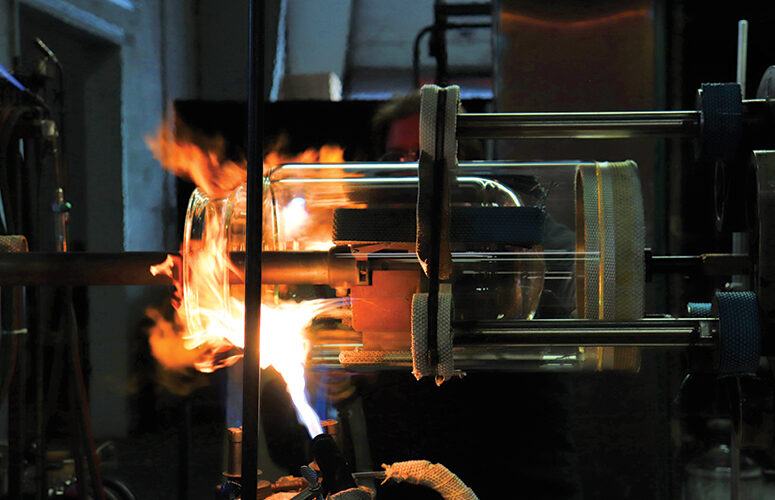
Advanced Manufacturing: Fabricating for Success
The technology behind advanced manufacturing is delivering better-built products, but skilled workers are needed to man the machines in this high-paying career.
By John Harrington, Contributing Writer On Jun 2, 2022This might be a moment for advanced manufacturing in New Jersey as disruptions in the supply chain may have convinced more New Jersey companies to purchase products locally rather than from abroad.
What exactly is advanced manufacturing? It is the use of innovative technologies to create existing products and new products. It can include production activities that depend on information, automation, computation, software, sensing and networking. It is a systems-based approach to maximizing efficiency and precision in manufacturing. Modern, or advanced manufacturing, is much safer and offers long-term career growth.
“The benefit (to advanced manufacturing) is you get an extremely high-quality finished product because the machining of it is precise,” says Paul Schindel, chapter executive for the New Jersey and Eastern Pennsylvania Chapter of the National Tooling and Machining Association. “Before advanced manufacturing, workers would have to tweak machines to specifications. Companies in New Jersey can now have a finished product sooner that is of higher quality instead of waiting for something of lesser quality from China.”
Other benefits include increases in productivity, better pathways to innovation, and reduction in production time with virtualization. Communication processes, both internal and external, also are improved.
Among the technologies behind advanced manufacturing are: Computer technology (CAD, CAE, and CAM); high-performance computing; rapid prototyping; high-precision technologies; additive manufacturing; advanced robotics; control systems to monitor processes; sustainable and green processes and technology (ESG); inventory management processes; supply-chain transparency; and tracking hardware and software.
Michael Womack, marketing and communications manager at the New Jersey Manufacturing Extension Program (NJMEP), says nutraceuticals, pharmaceuticals, medical devices, food processing, Department of Defense contractors, photonics and heavy industrial manufacturers are among the sectors heavily investing in these technologies.
The manufacturing sector overall contributed $54 billion to New Jersey’s gross domestic product in 2020, or about 10.1% of all output, according to the New Jersey Department of Labor and Workforce Development.
Within the sector, the biggest segment is chemical manufacturing, which in 2020, employed 44,400 people in New Jersey. Chemical manufacturing accounts for $18.5 billion of the GDP.
Computer and electronic products manufacturing is the fastest-growing industry among manufacturers, increasing its GDP to $6.1 billion in 2020 from $464 million in 1997, and is the third-highest output of GDP in New Jersey.
The job-creation potential in the manufacturing sector is considerable. According to NJMEP, there are 40,000 high-tech, well-paying manufacturing jobs that are unfilled. New employment opportunities are being added as manufacturing becomes more advanced.
“This is a steadily growing part of the economy,” Schindel adds. “This is not like automation that puts people out of work. Advanced manufacturing increases capacity.”
The manufacturing community has always faced challenges in New Jersey because of the state’s high costs and regulatory overreach. However, the biggest problem, industry leaders say, is finding workers to fill these positions.
“We’re looking to take advantage of the momentum behind manufacturing and the problems with the supply chain and the opportunities there,” says Chris Emigholz, vice president of government affairs at the New Jersey Business & Industry Association (NJBIA). “Also, many workers in lower-paying retail jobs lost them during the pandemic and this is their chance at more secure, better-paying jobs.”
Another issue facing the manufacturing sector is that the average age of the workers is skewing older. The share of the manufacturing workforce under the age of 35 has decreased to 23% over the last 20 years from 27%, according to the New Jersey Department of Labor.
NJBIA and NJMEP have partnered to form the Manufacturing Counts program. Part of the initiative entails is getting the word out about the availability of jobs and the awareness of job-training programs at community colleges and technical institutions. “They are doing a pretty good job of training them,” Schindel says. “The problem is there are not enough prospective workers. This has been a decades-old problem in manufacturing.”
As part of the upskilling process, advanced manufacturing requires shop math, engineering, safety, maintenance and awareness, welding, computer numerical control, computer-aided design, programming and robotics maintenance. Some fields, such as life sciences and photonics, can require advanced STEM degrees.
The outreach also involves attracting more women and minorities to the sector. In New Jersey, 36% of the manufacturing workforce were women, according to the New Jersey Department of Labor.
“Diversity, equity, and inclusion is the focus of our work and justly so,” Emigholz says. “We have to get a younger, more diverse workforce.”
Four-year education institutions are involved as well. Rutgers University has established the New Jersey Advanced Manufacturing Institute (NJAMI), which seeks to elevate the state’s manufacturing profile. NJAMI, working with Rutgers Engineering, plans to leverage its business partnerships and build industry networks, as well as develop high-tech ecosystems to attract federal, state and private investment. NJAMI also will provide a platform to develop research that can lead to commercialization and licensing opportunities, business development and higher-paying jobs throughout the state.
New Jersey Institute of Technology hosts Industry 4.0 /Smart Manufacturing events featuring panelists from New Jersey businesses who are in different stages of advanced manufacturing adoption. The business owners detail the challenges, mistakes and benefits in building out a smart manufacturing business. Events have featured a technology partner speaking about the different types of software to help organizations collect and visualize machine data.
Keeping the manufacturing skill level of New Jersey’s workforce current helps sustain the state’s advantage in its geographic location between New York City and Philadelphia.
“In New Jersey,” Emigholz says, “all manufacturing needs to be advanced manufacturing.”
To access more business news, visit NJB News Now.
Related Articles:





